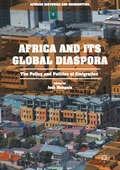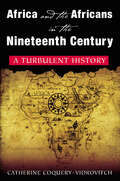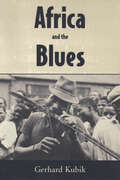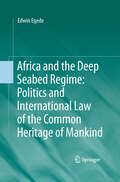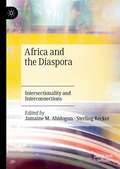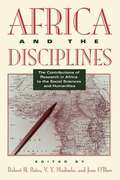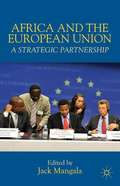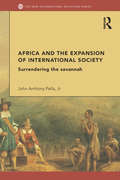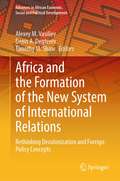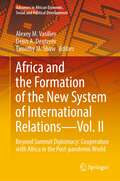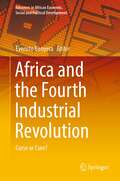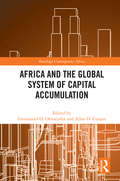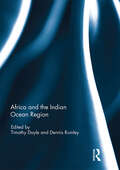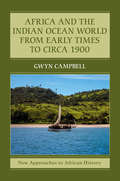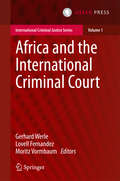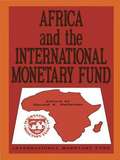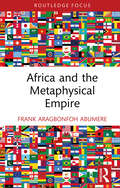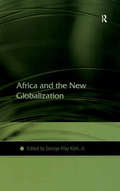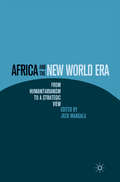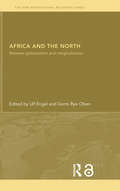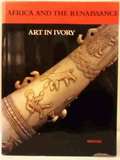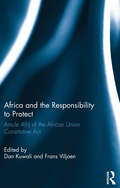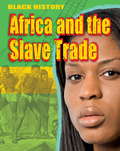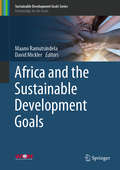- Table View
- List View
Africa and its Global Diaspora: The Policy and Politics of Emigration (African Histories and Modernities)
by Jack MangalaThe book presents a thorough study of the changing landscape of state-diaspora relations in Africa, as well as a robust analysis of diaspora engagement policies being pursued across the continent. As the Africa diaspora strengthens its socio-economic and political clout, countries of origin in Africa have sought to engage their citizens living abroad. Over the past decade, the role of diaspora in the homeland development has become a core tenet of national strategies and policies. Against the backdrop of expanding globalization and deepening regional integration, the book presents a thorough study of the changing landscape of state-diaspora relations in Africa, as well as a robust analysis of diaspora engagement policies being pursued across the continent as states seek to extend rights to and extract obligations from their global citizens.
Africa and the Africans in the Nineteenth Century: A Turbulent History
by Mary Baker Catherine Coquery-VidrovitchMost histories seek to understand modern Africa as a troubled outcome of nineteenth century European colonialism, but that is only a small part of the story. In this celebrated book, beautifully translated from the French edition, the history of Africa in the nineteenth century unfolds from the perspective of Africans themselves rather than the European powers.It was above all a time of tremendous internal change on the African continent. Great jihads of Muslim conquest and conversion swept over West Africa. In the interior, warlords competed to control the internal slave trade. In the east, the sultanate of Zanzibar extended its reach via coastal and interior trade routes. In the north, Egypt began to modernize while Algeria was colonized. In the south, a series of forced migrations accelerated, spurred by the progression of white settlement.Through much of the century African societies assimilated and adapted to the changes generated by these diverse forces. In the end, the West's technological advantage prevailed and most of Africa fell under European control and lost its independence. Yet only by taking into account the rich complexity of this tumultuous past can we fully understand modern Africa from the colonial period to independence and the difficulties of today.
Africa and the Blues (American Made Music Series)
by Gerhard KubikIn 1969 Gerhard Kubik chanced to encounter a Mozambican labor migrant, a miner in Transvaal, South Africa, tapping a cipendani, a mouth-resonated musical bow. A comparable instrument was seen in the hands of a white Appalachian musician who claimed it as part of his own cultural heritage. Through connections like these Kubik realized that the link between these two far-flung musicians is African-American music, the sound that became the blues. Such discoveries reveal a narrative of music evolution for Kubik, a cultural anthropologist and ethnomusicologist. Traveling in Africa, Brazil, Venezuela, and the United States, he spent forty years in the field gathering the material for Africa and the Blues. In this book, Kubik relentlessly traces the remote genealogies of African cultural music through eighteen African nations, especially in the Western and Central Sudanic Belt. Included is a comprehensive map of this cradle of the blues, along with 31 photographs gathered in his fieldwork. The author also adds clear musical notations and descriptions of both African and African American traditions and practices and calls into question the many assumptions about which elements of the blues were "European" in origin and about which came from Africa. Unique to this book is Kubik's insight into the ways present-day African musicians have adopted and enlivened the blues with their own traditions. With scholarly care but with an ease for the general reader, Kubik proposes an entirely new theory on blue notes and their origins. Tracing what musical traits came from Africa and what mutations and mergers occurred in the Americas, he shows that the African American tradition we call the blues is truly a musical phenomenon belonging to the African cultural world.
Africa and the Deep Seabed Regime: Politics And International Law Of The Common Heritage Of Mankind
by Edwin EgedeThis book seeks to fill a gap in the existing literature by examining the role of African States in the development and establishment of the regime of the deep seabed beyond national jurisdiction (the Area) and the concept of the Common Heritage of Mankind.
Africa and the Diaspora: Intersectionality and Interconnections
by Jamaine M. Abidogun Sterling ReckerThis edited volume presents intersectionality in its various configurations and interconnections across the African continent and around the world as a concept. These chapters identify and discuss intersectionalities of identity and their interplay within precolonial, colonial, and neo-colonial constructs that develop unique and often conflicting interconnections. Scholars in this book address issues in cultural, feminist, Pan African, and postcolonial studies from interdisciplinary and traditional disciplines, including the Arts, Humanities, and Social Sciences. While Intersectionality as a framework for race, gender, and class is often applied in African-American studies, there is a dearth of work in its application to Africa and the Diaspora.This book presents a diverse set of chapters that compare, contrast, and complicate identity constructions within Africa and the Diaspora utilizing the social sciences, the arts in film and fashion, and political economies to analyze and highlight often invisible distinctions of African identity and the resulting lived experiences. These chapters provide a discussion of intersectionality’s role in understanding Africa and the Diaspora and the intricate interconnections across its people, places, history, present, and future.
Africa and the Disciplines: The Contributions of Research in Africa to the Social Sciences And Humanities
by Robert H. Bates V. Y. Mudimbe Jean F. O'BarrAfrican Studies, contrary to some accounts, is not a separate continent in the world of American higher education. Its intellectual borders touch those of economics, literature, history, philosophy and art; its history is the story of the world, both ancient and modern. This is the clear conclusion of Africa and the Disciplines, a book that addresses the question: Why should Africa be studied in the American university?
Africa and the European Union
by Jack MangalaThe adoption of the Joint Africa-EU Strategy (JAES) in 2007 was a watershed moment in Africa-EU relations, one that sought to 'reinvent' a historical relationship to meet the challenges posed by complex interdependencies, expanding globalization, and growing competition, all framed by the gradual dislocation of the West as the epicenter of world politics. Five years into its implementation, this book offers a thorough and first comprehensive investigation of the JAES, the most advanced form of interregionalism seen to date.
Africa and the Expansion of International Society: Surrendering the Savannah (New International Relations)
by John Anthony Pella, JrThis book explores the West-Central African role in, and experience during, the expansion of international society. Building upon theoretical contributions from the English School of international relations, historical sociology and sociology, it departs from Euro-centric assumptions by analysing how West-Central Africa and West-Central Africans were integral to the ways in which Europe and Africa came together from the fifteenth century through to the twentieth. Initially, diverse scholarship concerned with the expansion of international society is examined, revealing how the process has often been understood as one dictated by Europeans. From there a new approach is developed, one which is better able to examine the expansion as an interactive process between individuals, and which puts the African experience at the heart of study. The empirical research that follows this draws upon primary sources to introduce a number of historically significant and ground-breaking cases into international relations, including; the international relations of West-Central Africa before the European arrival, the emergence and growth of the trans-Atlantic slave trade, the attempts to ‘civilize’ Africa, and the ‘scramble’ to colonize Africa. This book argues that the expansion of international society was driven by individual interaction, and was shaped by both Africans and Europeans. This book will be of interest to students and scholars of international relations, international relations theory, history, African politics, the English school and constructivism. Author John Anthony Pella introduces his book African and the Expansion of International Society: Surrendering the Savannah http://www.routledge.com/politics/articles/featured_author_john_anthony_pella/
Africa and the Formation of the New System of International Relations: Rethinking Decolonization and Foreign Policy Concepts (Advances in African Economic, Social and Political Development)
by Timothy M. Shaw Alexey M. Vasiliev Denis A. DegterevThis book discusses the prospects for the development of the African continent as part of the emerging system of international relations in the twenty-first century. African countries are playing an increasingly important part in the current system of international relations. Nevertheless, even 60 years after gaining their independence, most of them are confronted with regional and global issues that are directly related to their colonial past and its influence. Due to Africa’s wealth of natural and geopolitical resources, the possibility of interference in the internal affairs of African countries on the part of new and traditional global actors remains very real. Leading Africanists, together with international scholars from both international relations and African studies, examine the experience of decolonization, the impact of the emergence of a unipolar world on the African continent, and the growing influence of new international actors on the African continent in the twenty-first century. In addition, the importance of African countries’ foreign policy concepts and ideological attitudes in the post-bipolar period is revealed. “This volume strengthens the intellectual bridge between Russian, African and Western scholars of international relations. Strongly recommended!” Vladimir G. Shubin, Institute for African Studies, Russian Academy of Sciences “This book presents a wide range of prominent global scholars who bring a wealth of knowledge on the subject of Africa and the world.” Gilbert Khadiagala, Jan Smuts Professor of International Relations and Director of the African Centre for the Study of the USA (ACSUS) at the University of the Witwatersrand, Johannesburg, South Africa. “As a genuine contribution to the field of international relations and Global South Agency, this book should be in every institution of higher education’s library.” Lembe Tiky, Director of Academic Development, International Studies Association.
Africa and the Formation of the New System of International Relations—Vol. II: Beyond Summit Diplomacy: Cooperation with Africa in the Post-pandemic World (Advances in African Economic, Social and Political Development)
by Timothy M. Shaw Alexey M. Vasiliev Denis A. DegterevIn light of the growing number of African summits and a new awareness of international interdependence during the COVID-19 pandemic, this book provides a comprehensive analysis of the current state of Africa’s international relations (IR). Leading IR scholars from Africa and around the world examine international cooperation with African countries in areas such as health care, education, and peacekeeping and explore how Africa’s role in the system of international relations has changed during the COVID-19 pandemic.The book is divided into four parts, the first of which explores analyzes the various actors that constitute African agency in the post-pandemic world, while the second focuses on the summits of the major powers regarding cooperation with Africa. The third part covers public health cooperation and regional initiatives in Africa, including issues such as vaccine diplomacy, while the fourth and final part discusses conflicts & political process despite COVID Pandemics.
Africa and the Fourth Industrial Revolution: Curse or Cure? (Advances in African Economic, Social and Political Development)
by Everisto BenyeraThis book examines the epistemological, political, and socio-economic consequences of the Fourth Industrial Revolution (4IR) for Africa. Presenting various case studies on epistemic freedom, theology, race and robotics, tertiary education, political and economic transformation, human capital, and governance, it debates whether the 4IR will be part of the solution to the African problem, namely that of coloniality in its various forms. Solving the African problem using the 4IR requires ethical, just and epistemologically independent leadership. However, the lack of ICT infrastructure militates against Africa’s endeavours to make the 4IR a problem-solving moment. To its credit, Africa possesses some of the major capital needed (human, mineral, and social), and it constitutes a huge market comprising a young population eager to participate in the 4IR as problem-solvers and not as a problem to be solved—as equal citizens and not as the marginalized other.
Africa and the Global System of Capital Accumulation (Routledge Contemporary Africa)
by Emmanuel O. OritsejaforAfrica and the Global System of Capital Accumulation offers a groundbreaking analysis of the strategic role Africa plays in the global capitalist economy. The exploitation of Africa’s rich resources, as well as its labor, make it possible for major world powers to sustain their authority over their own middle-class populations while rewarding African collaborators in leadership positions for subjecting their populations into poverty and desperation. Middle-class obsessions such as computers, mobile phones, cars and the petroleum that fuels them, diamonds, chocolate – all of these products require African resources that are typically obtained by child or slave labor that helps to generate billionaires out of foreign investors while impoverishing most Africans. Oritsejafor and Cooper demonstrate that "primitive accumulation," believed by both Adam Smith and Karl Marx to be a process that precedes capitalism, is actually an integral part of capitalism. They also validate the thesis that capitalism incorporates racism as an organizing tool for the exploitation of labor in Africa and on a global scale. Case studies are presented on Nigeria, Cote d’Ivoire, Ghana, Liberia, Congo, Tanzania, Somalia, Angola, Namibia, Sao Tome and Principe, and South Sudan. There are also chapters analyzing the interests of Russia and China in Africa. This book will be of interest to students and scholars of African politics, development, and economics.
Africa and the ICC
by Clarke Kamari M. Knottnerus Abel S. De Volder EefjeAfrica and the ICC: Realities and Perceptions comprises contributions from prominent scholars of different disciplines including international law, political science, cultural anthropology, African history and media studies. This unique collection provides the reader with detailed insights into the interaction between the African Union and the International Criminal Court (ICC), but also looks further at the impact of the ICC at a societal level in African states and examines other justice mechanisms on a local and regional level in these countries. This investigation of the ICC's complicated relationship with Africa allows the reader to see that perceptions of justice are multilayered.
Africa and the Indian Ocean Region
by Timothy Doyle Dennis RumleyThis book examines the presence of Africa as a significant force in the western Indian Ocean. Africa will increasingly play a pivotal role in the future of the geopolitics of the Indian Ocean region. The book considers the scope for greater African involvement in Indian Ocean region-building activities, and seeks to encourage a western Indian Ocean dialogue. The book publishes some of the best papers presented at an Indian Ocean Research Group (IORG Inc.) symposium held in Nairobi, Kenya, in 2013, entitled "The Political Economy of Maritime Africa in the Indian Ocean Region." This symposium was part of a larger project on constructing a sense of "Indian Oceanness". Chapters include: India’s new policy of engagement with Africa; China’s growing presence in the Indian Ocean Region; security strategies in the Western Indian Ocean; the increasing importance and significance of the Western Indian Ocean littoral; and cultural linkages between Africa and the Indian Ocean region. This book was previously published as a special issue of the Journal of the Indian Ocean Region.
Africa and the Indian Ocean World from Early Times to Circa 1900 (New Approaches to African History #14)
by Gwyn CampbellThe history of Africa's historical relationship with the rest of the Indian Ocean world is one of a vibrant exchange that included commodities, people, flora and fauna, ideas, technologies and disease. This connection with the rest of the Indian Ocean world, a macro-region running from Eastern Africa, through the Middle East, South and Southeast Asia to East Asia, was also one heavily influenced by environmental factors. In presenting this rich and varied history, Gwyn Campbell argues that human-environment interaction, more than great men, state formation, or imperial expansion, was the central dynamic in the history of the Indian Ocean world (IOW). Environmental factors, notably the monsoon system of winds and currents, helped lay the basis for the emergence of a sophisticated and durable IOW 'global economy' around 1,500 years before the so-called European 'Voyages of Discovery'. Through his focus on human-environment interaction as the dynamic factor underpinning historical developments, Campbell radically challenges Eurocentric paradigms, and lays the foundations for a new interpretation of IOW history.
Africa and the International Criminal Court (International Criminal Justice Series #1)
by Gerhard Werle Lovell Fernandez Moritz VormbaumThe book deals with the controversial relationship between African states, represented by the African Union, and the International Criminal Court. This relationship started promisingly but has been in crisis in recent years. The overarching aim of the book is to analyze and discuss the achievements and shortcomings of interventions in Africa by the International Criminal Court as well as to develop proposals for cooperation between international courts, domestic courts outside Africa and courts within Africa. For this purpose, the book compiles contributions by practitioners of the International Criminal Court and by role players of the judiciary of African countries as well as by academic experts.
Africa and the Metaphysical Empire (Routledge Studies in African Philosophy)
by Frank Aragbonfoh AbumereThis book investigates whether African cultures can appropriate some useful aspects of Western cultures, or whether doing so risks falling into the metaphysical empire and diluting African identity.Ngugi wa Thiong’o and Ndlovu-Gatsheni characterise the metaphysical empire as an intangible non-physical and non-geographical invasion of the mental universe of formerly colonised peoples. As mutual exclusivists, they argue that authentic decolonization necessitates a complete dissociation of the African and her culture from colonial heritage. However, cultural appropriationists such as Wole Soyinka, Chinua Achebe and Chimamanda Ngozi Adichie argue that the African adoption of colonial heritage such as the English language is in no way antithetical to decolonization. This book delves into the debate by exploring the strengths and weaknesses of cultural appropriationism and, on the other hand, testing the validity of mutual exclusivism. The book demonstrates that cultural appropriation without falling into the metaphysical empire is possible, but that this poses important questions about the nature of the decolonization project itself, and where it should start and stop. A more accommodative decolonization would recognize the relationship between cultural universals and particulars, whilst also creating room for cultural appropriation. Ultimately, the book argues that both cultural appropriationists and mutual exclusivists must simultaneously renounce absolutism. By being amenable to a fusion of horizons, discourse can move beyond the decolonization fallacy of arguing that things are always either/or.This original and important contribution to the metaphysical empire debate will be a seminal read for researchers across the fields of philosophy, political science, African studies, and Black studies.
Africa and the New Globalization
by Jr. George Klay KiehGlobalization is not a new phenomenon in the international system. However, the various phases of globalization have had divergent scopes, actors, dimensions and dynamics - that is, each of the phases of globalization can be differentiated according to these terms. Against this background, this book focuses on the 'new globalization', a phase that emerged when the Cold War ended and which is, significantly, the most expansive and technologically advanced of all the phases of globalization. The contributors identify and discuss many of the frontier issues in Africa that are being impacted by the dynamics of this new globalization - debt, human rights, development, state sovereignty, the environment, and the HIV/AIDS pandemic. The volume will hold particular interest for students, scholars and researchers of African and development politics.
Africa and the NewWorld Era: From Humanitarianism to a Strategic View
by Jack MangalaOver the last decade, there has been a shift toward a strategic view of Africa. China and the US import much of their oil from Africa which is clearly emerging on the world stage as a strategic player. Africa and the New World Era probes the importance and significance of this shift and its implications for Africa's international relations.
Africa and the North: Between Globalization and Marginalization (New International Relations)
by Ulf Engel Gorm Rye OlsenAn important new discussion of Africa's place in the international system. This volume discusses Africa's place in the international system, examining the way in which the Westphalian system, in light of the impact of globalization and transnational networks, continues to play a major role in the structuring of Africa's international relations.The book provides a solid empirical analysis of key global players in Africa - France, the UK, the US, Japan, Germany, the EU and the UN - and of their policies towards the region. In the context of the 'war against terrorism', African political stability becomes a consideration of increasing importance. By analyzing the relevance of the states in the North, this book challenges conventional wisdom in recent international relations thinking. It applies the concept of an 'international policy community' to bridge the gap between the 'domestic' and the 'international', explaining why Africa retains a role in global politics out of any proportion to its economic weight.
Africa and the Renaissance: Art in Ivory
by Ezio Bassani William B. FaggThe first objects from Black Africa to reach European collections were ivories brought from West Africa to Portugal in the last years of the fifteenth century. Records of import duties paid at Lisbon for the year 1504-05
Africa and the Responsibility to Protect: Article 4(h) of the African Union Constitutive Act
by Dan Kuwali Frans ViljoenSituations of serious or massive violations of human rights are no longer purely of domestic concern, and sovereignty can no longer be an absolute shield for repressive governments in such circumstances. Based on this realization, the international community has recognized a responsibility to protect individuals in states where their governments are unable or unwilling to provide protection against the most serious violations. However, so far, only one intergovernmental organization, the African Union (AU), has explicitly made the right to intervene in a Member State part of its foundational text in Article 4(h) of its Constitutive Act. Although there have been cases of Article 4(h)-type interventions in Africa, the AU Assembly has not yet invoked Article 4(h) explicitly. This book brings together experts in the field to explore the potential application of Article 4(h), and the complexities that may explain its non-invocation so far. Although Article 4(h) is noble in purpose, its implementation faces several legal and policy challenges given that the use of force penetrates the principles of state sovereignty and non-intervention – the very cornerstones upon which the AU is founded. This book considers these issues, as well as the need to reconcile Article 4(h), in so far as it allows the AU to exercise military intervention to protect populations at risk of mass atrocities, with the provisions of the Charter of the United Nations. Drawing from the insights of law, political science, diplomacy and military strategy, the book offers a unique combination of multi-disciplinary expertise that harnesses the views of a diverse group of authors, focused on the legal, policy, and practical insights on the implementation of Article 4(h) and the responsibility to protect in Africa in order to provide concrete recommendations on how to end mass atrocities on the continent
Africa and the Slave Trade (Black History #1)
by Dan Lyndon-CohenUnderstand the impact of the transatlantic slave trade on Africa and on the lives of enslaved Africans. Slavery has existed in parts of the world for thousands of years. As slaves, people were traded and kept as possessions to serve their owners. It wasn't until the Transatlantic Slave Trade began that so many were enslaved and transported from one continent - Africa.The Black History series brings together a wide range of events and experiences from the past to promote knowledge and understanding of black culture today.
Africa and the Sustainable Development Goals (Sustainable Development Goals Series)
by Maano Ramutsindela David MicklerThe book draws upon the expertise and international research collaborations forged by the Worldwide Universities Network Global Africa Group to critically engage with the intersection, in theory and practice, of the Sustainable Development Goals (SDGs) and Africa’s development agendas and needs. Further, it argues that – and demonstrates how – the SDGs should be understood as an aspirational blueprint for development with multiple meanings that are situated in dynamic and contested terrains. As the SDGs have substantial implications for development policy and resourcing at both the macro and micro levels, their relevance is not only context-specific but should also be assessed in terms of the aspirations and needs of ordinary citizens across the continent. Drawing on analyses and evidence from both the natural and social sciences, the book demonstrates that progress towards the SDGs must meet demands for improving human well-being under diverse and challenging socio-economic, political and environmental conditions. Examples include those from the mining industry, public health, employment and the media. In closing, it highlights how international collaboration in the form of research networks can enhance the production of critical knowledge on and engagement with the SDGs in Africa.
